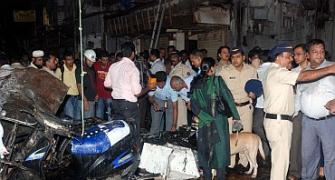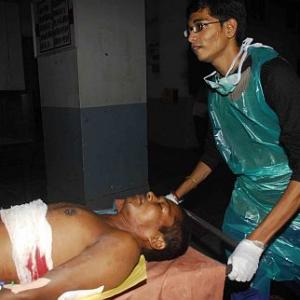Barely two days after the fifth anniversary of the 7/11 serial train bombings in Mumbai, terror hit the commercial capital yet again on Wednesday.
6:54 pm at Zaveri Bazaar, 6:55 pm at Opera House, and 7:05 pm at Kabutarkhana in Dadar-- three blasts momentarily almost crippling the economic nerve-centre of India. Not only is the modus operandi common to the 2008 Gujarat blasts, but even the locations chosen are in sync with the previous targets attacked by terrorists in 2005.
In the latest attack, it appears that the perpetrators have taken care to choose locations largely dominated by the Gujarati trading community. Take Opera House, Zaveri Bazaar or even the Dadar Kabutarkhana area which has a sizeable Gujarati (Kutchi)-run trading establishments.
Amidst utter chaos tempers were running high. "We generate employment for over five lakh people (500,000) and a turnover of over 30 million dollars a month. What is the government doing to secure us? We were attacked in 2005 as well but the government doesn't seem to have learnt any lessons," says an angry diamond trader, Pushpendra Shah, who runs his diamond business at Opera House where the blast took place just outside the city chambers located at the Mumbai Diamond Traders Association
"We have taken care of ourselves during the worst of times. Be it Zaveri Bazaar, or even the 7/11 serial train blasts. The government claims that they have upgraded the security establishment. But clearly they are unprepared," says Jayesh Labdhi, committee member, Mumbai Diamond Traders Association.
Even as Chief Minister Prithviraj Chavan denied that the Gujarati community has been targeted, he told the media that "Yes, you can call this a terror attack with the aim to disrupt the economic and communal harmony of the city and the country.
Meanwhile, several teams of the Mumbai police, Mumbai police Crime Branch, Maharashtra's Anti Terrorism Squad and the National Investigation Agency have been formed to track the terrorists. While the local police teams will concentrate on maintaining law and order, special Crime Branch, ATS and NIA teams will work on leads gathered through the interrogation of scores of Indian Mujahideen operatives lodged in various jails across Mumbai, Gujarat, Delhi and Madhya Pradesh.
As many as 66 alleged IM operatives are lodged in Gujarat's Sabarmati jail alone. A forensic team from Hyderabad's Central Forensic Science Laboratory is also coming down to Mumbai.
Sources within the investigating agencies suspect that a fresh Indian Mujahideen module has been activated, which is independent of other modules that have been successfully cracked by several state anti-terrorism units.
Traces of a chemical suspected to be ammonium nitrate are said to have been found in the nails embedded in the bodies of victims admitted in hospitals, pointing to the involvement of the Indian Mujahideen whose signature explosive is ammonium nitrate.
Samples from all the blast sites have been collected by forensic experts, and a report on the make and composition of the explosive is expected to be ready in the next couple of days.







